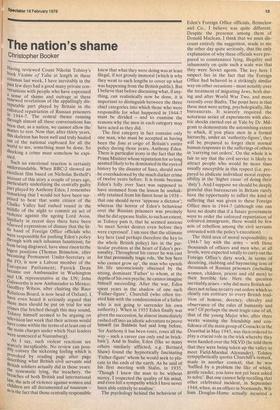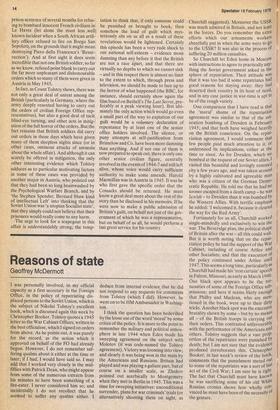The nation's shame
Christopher Booker
Having reviewed Count Nikolai Tolstoy's book Victims of Yalta at length in these columns last week, I have inevitably in the Past few days had a good many private conversations with people who have expressed a sense of shame and outrage at these renewed revelations of the appallingly disreputable part played by Britain in the enforced repatriation of Russian prisoners in 1944-7. The central theme running through almost all these conversations has I been that, as a nation, we cannot allow the ' matter to rest. Now that, after thirty years, this skeleton has been well and truly hauled out of the national cupboard for all the world to see, something must be done. So Shocking a crime must somehow be expiated.
Such an emotional reaction is certainly understandable. When BBC-2 showed an excellent film based on Nicholas Bethell's account of this story a couple of years ago, Particularly underlining the centrally guilty Part played by Anthony Eden, I remember remarking that I would not have been sur prised to • hear that some citizen of the Chalke Valley had rushed round in the middle of the night to commit an act of violence against the ageing Lord Avon. Similarly in recent days there have been renewed expressions of dismay that the lit tle band of Foreign Office officials who were responsible for pushing Eden's policy through with such inhuman fanaticism, far
from being disgraced, have since risen to the higest positions (Thomas Brimelow, after becoming Permanent Under-Secretary at f,be FO, is now a Labour member of the turopeao Parliament; Patrick Dean became our Ambassador in Washington and UK representative at the UN; John Galsworthy is now Ambassador to Mexico; Geoffrey Wilson, after chairing the Race Relations Board, is now head of Oxfam). I have even heard it seriously argued that these men should be put on trial for war crimes (far fetched though this may sound, Tolstoy himself seemed to be arguing on television last week that their actions would have come within the terms of at least one of the main charges under which Nazi leaders were sentenced at Nuremburg). As I say, such violent reactions are Scarcely inexplicable. No review can posslblY convey the sickening feeling which is Provoked by reading page after page describing what British civil servants and British soldiers actually did in those years: he systematic lying, the treachery, the 'reaches of both British and international law, the acts of violence against women and Children are all documented ad nauseam — as is the fact that those centrally responsible
knew that what they were doing was at least illegal, if not grossly immoral (which is why they went to such lengths to cover up what was happening from the British public). But I believe that before discussing what, if anything, can realistically now be done, it is important to distinguish between the three chief categories into which those who were responsible for what happened in 1944-7 must be divided — and to examine the reasons why the men in each category may have acted as they did.
The first category in fact contains only one man, who must be accepted as having been the fons et origo of Britain's entire policy during those years, Anthony Eden. There is particular irony in the fact that the Prime Minister whose reputation for so long seemed likely to be dominated in the eyes of history by the disaster of Suez, should now be overshadowed by the much darker crime of twelve years before. It is ironic because Eden's folly over Suez was supposed to have stemmed from the lesson he unshakably retained from his finest hour in 1938 — that one should never 'appease a dictator'; whereas the horror of Eden's behaviour over the Russian prisoners was precisely that he did appease Stalin, to such an extent, as Tolstoy puts it, that he seemed anxious `to meet Soviet desires even before they were expressed'. I am sure that the ultimate key here (and perhaps therefore the key to the whole British policy) lies in the particular problem at the heart of Eden's personality. Throughout his career he was cast for that perennially tragic role, 'the boy hero who cannot grow up', the man who spends his life unconsciously obsessed by the strong, dominant 'Father' to whom, at the depths of his own psyche, he cannot imagine himself succeeding. After the war, Eden spent years in the shadow of one such 'Father-figure', Churchill (who often treated him with the condescension of a father who is not going to surrender his own authority). When in 1955 Eden finally was given the succession, he almost immediately rushed off into an idiotic adventure to-prove himself (as Baldwin had said long before, 'for Anthony it has been roses, roses all the way — such a career can only end in brickbats'). And in Stalin, Eden (like so many others similarly afflicted, e.g. Bernard.. Shaw) found the hypnotically fascinating 'Father-figure' whom he would seek to placate to the ends of the earth. As he said of his first meeting with Stalin, in 1935, 'Though I knew the man to be without mercy, I respected the quality of his mind, and even felt a sympathy which I have never been able entirely to analyse'.
The psychology behind the behaviour of Eden's Foreign Office officials, Brimelow and Co., I believe was quite different. Despite the presence among them of Donald Maclean, I think that we must discount entirely the suggestion, made to me the other day quite seriously, that the only explanation of why these officials were prepared to countenance lying, illegality and inhumanity on quite such a scale was that they were Soviet agents. The key here I suspect lies in the fact that the Foreign Office had behaved in a strikingly similar way on other occasions — most notably over the treatment of migrating Jews, both during and after World War Two, and more recently over Biafra. The point here is that these men were acting, psychologically, like bureaucrats. It scarcely required the notorious series of experiments with electric shocks carried out at Yale by Dr. Milgram to demonstrate the astonishing extent to which, if you place men in a formal hierarchy, under an 'authority-figure', they will be prepared to forget their normal human responses to the sufferings of others in 'carrying out orders'. On the whole it is fair to say that the civil service is likely to attract people who would be more than usually susceptible in this respect (i.e. prepared to abdicate individual moral responsibility in the 'higher cause' of doing their 'duty). And I suppose we should be deeply grateful that bureaucrats in Britain rarely have the opportunity to inflict the kind of suffering that was given to these Foreign Office men in 1944-7 (although one can have no doubt that if a future government were to order the enforced repatriation of coloured:immigrants, there would be few acts of rebellion among the civil servants entrusted with the policy's execution).
The third area of moral responsibility in 1944-7 lay with the army — with those thousands of officers and men who, at all levels, were expected totally to carry out the Foreign Office's dirty work, in terms of deceiving, clubbing and bayoneting tens of thousands of Russian prisoners (including women, children, priests and old men) to their horrible fate. Here the question inevitably arises—why did more British soldiers not refuse to carry out orders which so clearly ran contrary to every British tradition of honour, decency, chivalry and observance of the rules of humanity and war? Of perhaps the most tragic case of all, that of the young Major who, after three weeks winning the friendship and confidence of the main group of Cossacks in the Drauthal in May 1945, was then ordered to play a crucial role in the trick whereby they were handed over the NKVD (he told them that they were being taken up the valley to meet Field-Marshal Alexander), Tolstoy sympathetically quotes Churchill's remark, made in another context, that he was 'baffled by a problem the like of which, gentle reader, you have not yet been asked to solve'. But one cannot help recalling that other celebrated incident, in September 1944, when, as an officer in Normandy, William Douglas-Home actually incurred a
prison sentence of several months for refusing to bombard innocent French civilians in Le Havre (let alone the must less .well I known incident when a South African artillery officer refused to fire on Borgo San Sepolcro, on the grounds that it might mean destroying Piero della Francesca's 'Resurrection'). And at first sight it does seem incredible that not one British soldier, so far as we know, refused point blank to carry out the far more unpleasant and dishonourable orders which so many of them were given in Austria in May 1945.
In fact, as Count Tolstoy shows, there was not only a great deal of unrest among the British (particularly in Germany, where the army deeply resented having to carry out the orders of civilian Foreign Office representatives), but also a good deal of tacit, blind-eye turning, and other acts in mitig-1 ation of the full horror of the orders. But the fact remains that British soldiers did carry out orders in those days which have given many of them sleepless nights since (or in other cases, ominous attacks of amnesia about the whole affair). And although it can scarely be offered in mitigation, the only other interesting evidence which Tolstoy adduces as to particular motivating factors in some of these cases was provided by another major in Austria, who pointed out that they had been so long brainwashed by the Psychological Warfare Branch, and by 'the Stephen Spender, Bernard Shaw kind of intellectual Left' into thinking that the Soviet Union was 'a utopian Socialist state', that they simply could not believe that their prisoners would really come to any harm.
The urge to look for a scapegoat in this affair is understandably strong; the temp
tation to think that, if only someone could' be punished or brought to book, then somehow the load of guilt which mysteriously sits on us all as a result of these revelations would be lightened. Certainly this episode has been a very rude shock to our national self-esteem — evidence more damning than any before it that the British are not a race apart, and that there are virtually no depths to which we cannot sink — and in this respect there is almost no limit to the extent to which, through press and television, we should be made to face up to the horror of what happened (the BBC, for instance, should certainly show again the film based on Bet hell's The Last Secret, preferably at a peak viewing hour). But ultimately the only action which would go even a small part of the way to expiation of our guilt would be a voluntary declaration of repentance by at least one of the senior office holders involved. The silence, or puny attempts at self-justification from Brimelow and Co. have been more damning than anything. And if not one of them is, now prepared to speak out, there is only one other senior civilian figure, centrally involved in the events of 1944-7 and still left alive, whose voice would carry sufficient authority to make some amends. Harold Macmillan was in Austria in 1945. It was he who first gave the specific order that the Cossacks should be returned. He must know a great deal more about the rest of the story than he disclosed in his memoirs. If he were now to make a public admission of Britain's guilt, 'on behalf not just of the government of which he was a representative, but on behalf of us all, he would perform a last great service for his country.



































 Previous page
Previous page